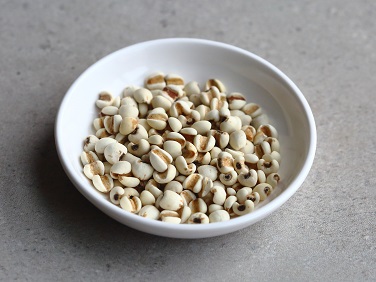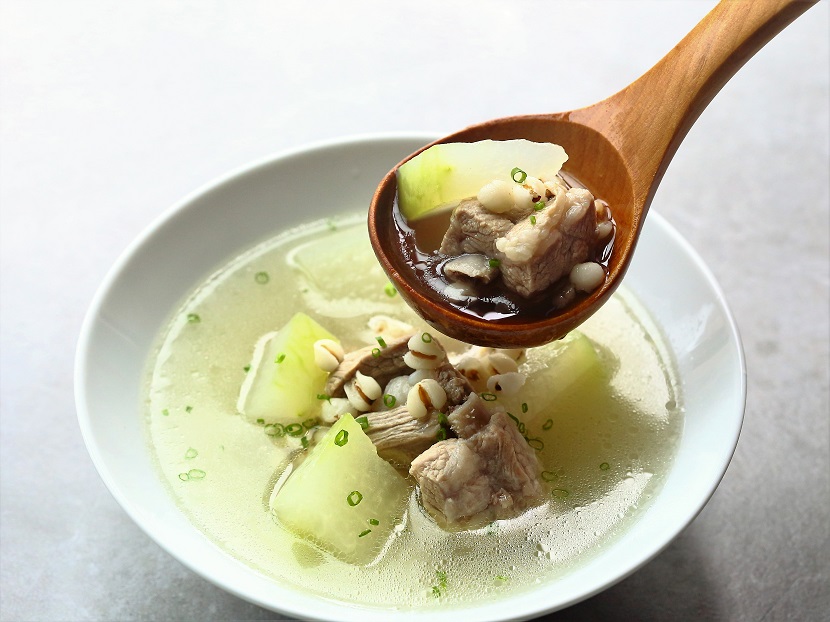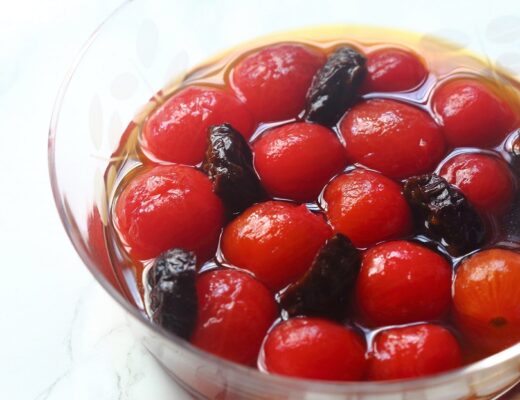Last Updated on March 3, 2021 by Simon Fan
Among several ancient grains that are being “rediscovered” in the US, Job’s tears is still relatively obscure.

Also known as coix seed, this versatile grain has been cultivated and consumed in Asia for millennia. Because it looks and tastes somewhat like pearl barley, it’s sometimes called Chinese pearl barley or Asian pearl barley. The truth is these two grains are not closely related (Job’s tears is gluten-free, by the way). Their differences are obvious when compared side by side, especially in size—the grain of Job’s tears is twice the size of barley.
In China, where it’s called Yi Ren (薏仁) or Yi Mi (薏米) among other names, Job’s tears has been used both as food and as medicine since ancient times. According to Traditional Chinese Medicine (TCM), Job’s tears has various medicinal properties including cooling, diuretic, and anti-swelling.
Summer is the best time to incorporate Job’s tears into your cooking to benefit from its cooling power.
The simplest recipe for Job’s tears is to simmer the grains in water to make a tea. Cooked grains of Job’s tears are plump with a tender and chewy texture similar to hominy. They have a unique nutty, earthy flavor and a mildly sweet taste. You can drink the tea plain or with some added sugar or honey.
Using Job’s tears for savory soups is an excellent way to give yourself both a tasty dish and food therapy, and my recipe today offers a good example. Here, Job’s tears is paired with winter melon, a wonderful summer vegetable that’s also known for its cooling effect on the body. With pork ribs adding flavor and depth, this delightful soup is both nourishing and healing in hot weather.
Don’t stop at making soup or tea though. Experiment with other ways of cooking this fantastic grain, such as in salads, grain bowls, or stews.
You can find Job’s tears at Chinese or Asian grocery stores, fine health food stores, and online. Because it can be named in so many ways, correctly and incorrectly, make sure to read all the information on the package or in the description to get the right stuff.
Job’s tears and winter melon soup with pork ribs (薏米冬瓜排骨汤)
Serves 2
Ingredients
½ lb (227 g) winter melon
½ lb (227 g) pork ribs, cut across the bone by your butcher into 1-inch (2.5 cm) slabs
1 oz (30 g) Job’s tears grains
1 scallion, white and green parts separated and green part thinly sliced
½-inch (1.3 cm) piece of ginger, sliced
1 teaspoon Shaoxing wine
2½ cups (600 ml) water
Salt and freshly ground white pepper
Directions
- Peel the winter melon and remove the pith and seeds. Cut the flesh into small rectangular pieces, about 2 x 1½ x ½ inches (5 x 3.8 x 1.3 cm). Place the peel in a spice bag or cheesecloth packet.
- Cut the ribs through the meat between every rib bone, creating small pieces. Blanch them in boiling water for 2 minutes. Drain in a colander and rinse under cold water to remove any scum.
- In a soup pot, add the Job’s tears, pork ribs, winter melon peel, scallion white, ginger, wine, and water. Bring to a boil, then reduce to a gentle simmer. Cover and cook, removing surface scum from time to time, until the pork ribs are tender and the grains are plump, about 45 minutes. Add the winter melon, and continue to simmer until the melon turns soft, about 10 minutes. Discard the peel, scallion, and ginger. Season to taste with salt and pepper. Serve hot or at room temperature, and garnish with the scallion green right before serving.




Braised winter melon with dried tiny shrimp | Soy, Rice, Fire
July 17, 2022 at 8:53 AM[…] well with strong-flavored ingredients, such as ham, fried fish, or dried shrimp in soups (example here) and braises (example here)—it acts like a sponge to soak up the flavorful cooking […]